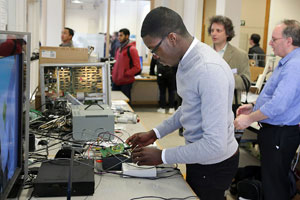
Computer Science student during the Final Year Project Open Day.
Strong employer links and targeted careers advice are behind the University of Essex bucking the national trend when it comes to computer science graduates having trouble getting jobs.
A new report has highlighted how universities need to work more closely with employers to tackle why 11.7 per cent of UK computer science graduates are still unemployed six months after leaving university.
However, at Essex employability rates for computer science graduates are consistently high and currently stand at 92.5 per cent for graduate level employability.
The Shadbolt Review of Computer Sciences Degree Accreditation and Graduate Employability highlighted the need to develop and maintain a clearer view about the skills that are sought in the work place and whether universities were successfully providing them.
Writing in the Times Higher Education, report author Sir Nigel Shadbolt said the UK’s world-leading research in computer science was driving the field forward worldwide and new services, businesses, opportunities and challenges arose from the discoveries made at UK universities.
“We have to continue to produce graduates who possess both the foundational knowledge of their subject and the skills required to innovate, collaborate and adapt. There is a clearly identifiable need for these skills, and universities and employers need to work in partnership to ensure that we meet the challenge.”
Professor Simon Lucas, Head of the School for Computer Science and Electronic Engineering at Essex, said the School had created an effective degree programme with excellent built-in links with local, regional and national employers where students could take part in a number of initiatives from collaborating on final year projects with employers, third year placement years in companies such as Rolls Royce, Intel, Microsoft, Ransomes Jacobsen, Aber Electronics, Eze Software, and GigaClear, to new degree apprenticeship courses developed with Tech Partnerships and ESCO, two national company organisations developing degree apprenticeship standards.
"The Shadbolt Review sets out a series of recommendations and best practice,” added Professor Lucas, “And it is encouraging to see that at Essex we already have these measures in place. Feedback from our students and our employability rates are testament to our longstanding links with the business community. Our existing degree programmes, accredited by professional bodies, and the introduction of a new Degree Apprenticeship in Digital and Technology Solutions make it an exciting time to work and study at Essex."
The University’s final year student research project – the Capstone Project - has been a key part of the professional development modules for computer science, giving students the opportunity to work closely with industry.
Project Coordinator Dr Anthony Vickers explained: “The Capstone Project has developed over the past few years to involve companies in a number of ways – from offering projects for students to work on with the company to inviting businesses to open days where students can showcase their work and gain invaluable feedback.
“On the back of both these initiatives students have gone on to get jobs and, for me, it is immensely satisfying to see how students develop from the first year to the third year and, ultimately, to see them getting jobs.”
■ Hear how student Ecaterina Gamanji, from the School for Computer Science and Electronic Engineering, succeeded in her placement year with Microsoft.